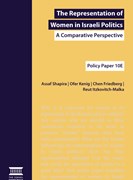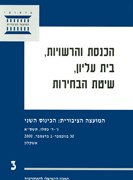

Publications Regarding ministers
Articles

The Coalition Agreements of Israel's 37th Government: The Appointment of Legal Advisors in Government Ministries
Written By: Dr. Guy Lurie
Turning ministry legal advisors into political appointees will deprive them of their ability to protect the rule of law and will reduce public trust in the ministries.

Splitting Up Ministries Will Undermine Effective Governance and the Public Service
Written By: Dr. Nadiv Mordechay
The trend to divvy up the government in political agreements has reached new heights - with detrimental impact on the ministries ability to provide high-quality service

The “Norwegian Law”: Problematic, Yes—But a Necessary Evil
Written By: Dr. Assaf Shapira
The “Norwegian Law” has many troubling and significant downsides - however Israel's parliament is simply too small.

Meridor's Resignation Raises Serious Concerns
“Meridor's resignation raises serious concerns that management of the worst economic crisis Israel has encountered in recent decades is characterized by a lack of systematic policies or priorities"

Recommendations for the Incoming Justice Minister
Written By: Dr. Nadiv Mordechay
After three contentious election campaigns Israel's new government has been sworn in. IDI's experts weigh-in with their recommendations on the most important issues on the agenda.

No Justification Whatsoever
Written By: Prof. Ofer Kenig
The establishment of the Netanyahu-Gantz government required many compromises.That being said, there is absolutely no way to justify the extravagant size of the new government

A Jumbo-Size Government? Now? Really?
Written By: Prof. Ofer Kenig
Reports of a 30 to 34 minister cabinet in the works beg for a public outcry: Costly, inefficient and divisive is not what we need today.

Revoking Limitation on Number of Ministers - Ramifications
It wastes public funds, impairs government efficiency, and hinders its capacity to promote policy

Reduce the Number of Ministers
Written By: Prof. Ofer Kenig
As talks begin toward the formation of a new government – it is an opportunity to call on the Prime Minister to keep the number of Ministers low

The Constitutional Tug of War in the Outgoing Coalition
Written By: Dr. Amir Fuchs
The 20th Knesset was the most injurious of all with regard to democratic values, freedom of expression, gatekeeping and, above all, minority rights. In the next government we can only hope that someone will champion liberal center-right values to continue to protect our democracy.

How Many Women Have Served in the Israeli Cabinet?
Written By: Prof. Ofer Kenig
The steady increase in the percentage of women in Israel's parliament has not been accompanied by a concomitant rise in their cabinet representation. In this article, IDI researcher Dr. Ofer Kenig argues that the new government that will be formed following the 2019 elections provides Israel with a golden opportunity to rectify this situation.

Parliamentary Work Index for Israel’s Political Parties
Written By: Dr. Assaf Shapira, Avital Friedman, Dr. Shahaf Zamir
A Special Analysis by the Israel Democracy Institute on which MKs make the most use of the parliamentary tools available to them.

Plurality of Israelis Welcome Yisrael Beiteinu into Coalition, Signaling 'Desire for Right-Wing Dominance'
A plurality of the Jewish public views the addition of Yisrael Beiteinu into the government coalition over Zionist Union as a step in a positive direction, according to the latest Peace Index, released this week by the Israel Democracy Institute and Tel Aviv University.

21 Ministers Express Support for Defense Minister Ya'alon, Come Out Against Killing Neutralized Terrorists
Among those who signed are former ministers of the National Religious Party and Likud

Tensions Arise Between Civil Service Comissioner and Director-General of the Prime Minister's Office
Yesterday, IDI held a roundtable discussion on how to appoint senior-level civil service professionals, under the direction of Eli Groner, director-general of the Prime Minister's office. At the forum, Groner discussed a dialogue that will take place Sunday in the Cabinet on the subject of establishing hiring search committees.

Israel Should Recognize Judaism's Main Denominations
Written By: Yohanan Plesner
IDI President Yohanan Plesner writes that Reform, Conservative, Orthodox, Reconstructionist and secular Jews are all members of the Jewish people. The Israeli government must grant equal recognition to the central movements within Judaism, including equal funding for all.

An Open Letter to the New Minister of Religious Services
Written By: Dr. Shuki Friedman
As the new government begins its work, Dr. Shuki Friedman, Director of IDI's Center for Religion, Nation and State offers recommendations to MK David Azoulay, Minister of Religious Services, on how to keep the rabbinate relevant and improve its standing in Israeli society.

Israel's 34th Government: A Profile
Written By: Prof. Ofer Kenig
On May 14, 2015, the 34th government of the State of Israel—the fourth Netanyahu cabinet—was sworn in. In this article, IDI Researcher Dr. Ofer Kenig presents an overview of the process of forming the government and the profile of its members.

Don't Increase the Number of Cabinet Ministers
Written By: Prof. Ofer Kenig
Dr. Ofer Kenig argues that amending the clause of the Basic Law that limits the number of ministers in the next government to 19 is not only unnecessary, but also brings about a sense of déjà-vu that the Knesset is defying the rules of the game once again.

The New Israeli Cabinet: An Overview of the 33rd Government of Israel
Written By: Prof. Ofer Kenig
How many parties make up the 33rd government of Israel? How many first time ministers does the cabinet have? What is the breakdown of men and women in the government? Dr. Ofer Kenig presents an overview of the 2013 Israeli cabinet.

Time for More Women in the Israeli Cabinet
Written By: Prof. Ofer Kenig
IDI Researcher Dr. Ofer Kenig surveys the percentage of women in the Israeli cabinet since the founding of the State and calls for a change for the better.

Coalition Building in Israel: A Guide for the Perplexed
Written By: Prof. Ofer Kenig
In an article specially written for the IDI website, Dr. Ofer Kenig explains the basic principles of the process of coalition building, sharing facts, figures, and comparative data.

A Preemptive Strike on Iran: Who has the Authority to Decide?
Written By: Eyal Tsur, Prof. Mordechai Kremnitzer
As the world considers the threat of a nuclear Iran, Israeli public discourse has focused primarily on whether or not Israel should launch a preemptive strike on Iran's nuclear facilities. But who has the authority to decide whether a military operation should be conducted? In this article, IDI Vice President Prof. Mordechai Kremnitzer and researcher Eyal Tsur explore the strengths and weaknesses of the current division of responsibility regarding this matter, and recommend ways of improving the system.

The 32nd Israeli Government: The 2009 Coalition
Written By: Prof. Ofer Kenig
IDI Researcher Dr. Ofer Kenig outlines the Israeli government elected in 2009, and explains why this particular five-party coalition may not succeed.


